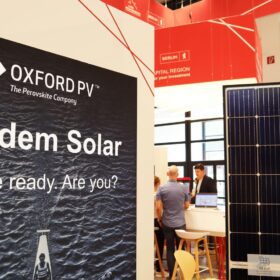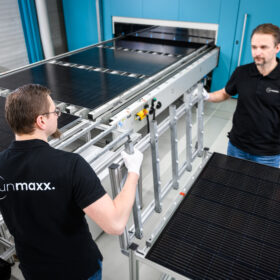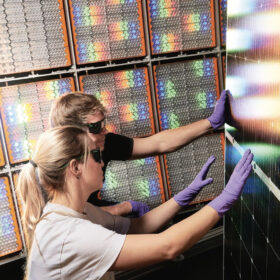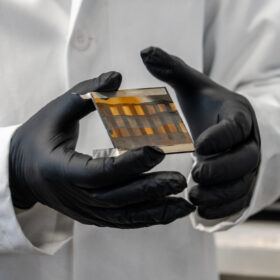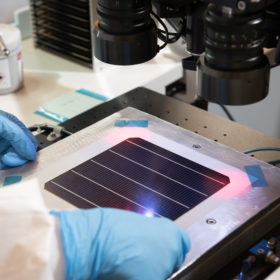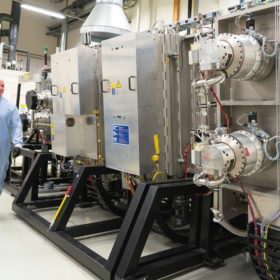Oxford PV starts commercial distribution of perovskite solar modules
Oxford PV is delivering its first commercial perovskite solar modules to US customers. The 72-cell solar modules have an efficiency of 24.5% and, according to the company, can generate up to 20% more energy than conventional silicon modules.
Sunmaxx PVT, Oxford PV present perovskite-silicon tandem solar thermal module with 80% overall efficiency
The new photovoltaic-thermal module, presented for the first time on the first day of Intersolar 2024, has a record electrical efficiency of 26.6% and thermal efficiency of 53.4%. The electrical output of the module with 6cm x 10cm M6 cells is 433 W.
Oxford PV unveils 26.9% perovskite tandem module efficiency record
Oxford PV has announced a record-setting 26.9% efficiency for its perovskite tandem module at Intersolar Europe 2024, the continent’s largest solar and energy storage event.
Shedding light on tandem perovskite solar cell progress
Perovskite PV devices are set to become the next big thing in solar with market analysts at S&P Global Commodity Insights predicting 1 GW of production by the end of 2024, rising to 6 GW in 2025. Perovskite tandem devices are at the front of the queue for commercialization but their characterization presents technical challenges.
Commercial perovskites imminent
Andries Wantenaar, a solar analyst at Rethink Energy, explains why he sees a bright future for perovskite PV cells, with technological advancements and major R&D investment paving the way for revolutionary change.
Oxford PV sets 28.6% efficiency record for full-size tandem cell
Oxford PV, a leading perovskite solar pv company with operations in England and Germany, achieved power conversion efficiency of 28.6% for a two-terminal perovskite-silicon tandem cell measuring 258.15 cm² cell: A world record for a device based on a ‘full size’ silicon wafer. The record was certified by Fraunhofer Institute for Solar Energy Systems (Fraunhofer ISE).
Weekend Read: Industry and researchers in tandem
As efficiency records tumble and devices become more stable, Europe is seeing the beginnings of a race to commercialize high-efficiency perovskite-silicon tandem solar products, reports Valerie Thompson.
Environmental impacts of perovskite PV
A life-cycle analysis of perovskite-silicon tandem modules indicates that additional environmental impacts in manufacturing are more than offset by the higher energy yield over their lifetime.
The weekend read: Plans for a fully fledged European PV supply chain
While Europe was previously a leader in the manufacturing of solar cells and modules, the plans falling into place this year already represent a scale never before seen on the continent. And they’ll need that scale if Europe is to meet expected demand for new solar over the coming decades, without relying heavily on imported products and components. Many of the technologies at the center of these plans are brand new as well; pv magazine looks at a few of the innovators planning to scale up alongside more mainstream players, and how these fit into plans for a fully fledged European PV supply chain.
Perovskite solar pioneers honored with prestigious prize
The work undertaken separately by seven academics to discover the promise of perovskite materials for solar, and to open the door to high-efficiency devices, has been recognized by the judges of the Rank Prize for Optoelectronics.
